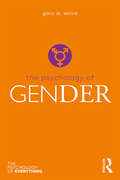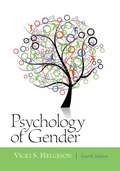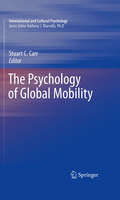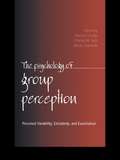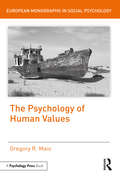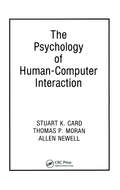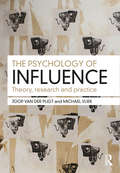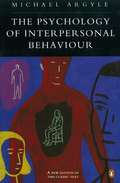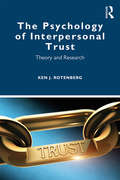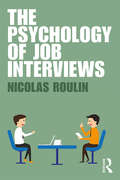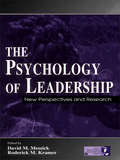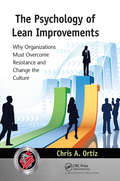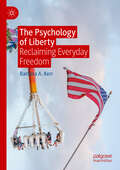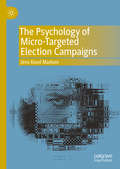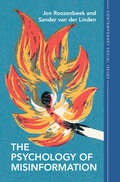- Table View
- List View
The Psychology of Financial Consumer Behavior (International Series on Consumer Science)
by Dominika MaisonThis book stresses the psychological perspective in explaining financial behavior. Traditionally, financial behaviors such as saving, spending, and investing have been explained using demographic and economic factors such as income and product pricing. The consequence of this way of thinking is that financial institutions view their clients mostly from the perspective of their income. By taking a psychological approach, this book stresses the perspective of consumers confronted with a quickly changing financial world: the changing of financial offers and products (savings, investments, loans), the changing of payment methods (from cash to cheques, cards and mobile payments), the accessibility and temptation of goods, and the changing of insurance and pension systems.The Psychology of Financial Consumer Behavior provides insight into the thought processes of consumers in a variety of financial topics. Coverage includes perceptions of wealth, the pleasure or pain of spending, cashless transactions, saving and investing, loans, planning for the future, taxes, and financial education. The book holds appeal for researchers, professionals, and students in economics, psychology, economic psychology, marketing and consumer science, or anyone interested in financial behaviors.
The Psychology of Food Marketing and Overeating
Integrating recent research and existing knowledge on food marketing and its effects on the eating behaviour of children, adolescents, and adults, this timely collection explores how food promotion techniques can be used to promote healthier foods. Numerous factors influence what, when, and how we eat, but one of the main drivers behind the unhealthy dietary intake of people is food marketing. Bringing together important trends from different areas of study, with state-of-the-art insights from multiple disciplines, the book examines the important factors and psychological processes that explain the effects of food marketing in a range of contexts, including social media platforms. The book also provides guidelines for future research by critically examining interventions and their effectiveness in reducing the impact of food marketing on dietary intake, in order to help develop new research programs, legislation, and techniques about what can be done about unhealthy food marketing. With research conducted by leading scholars from across the world, this is essential reading for students and academics in psychology and related areas, as well as professionals interested in food marketing and healthy eating.
The Psychology of Gender (The Psychology of Everything)
by Gary WoodWhat is the difference between sex and gender? What is the impact of gender-role stereotypes on our lives, our relationships and the world? What does gender mean to you? The Psychology of Gender looks at our biology, history and culture to consider the impact of gender roles and stereotypes, and addresses the 'dilemmas' we have regarding gender in a post-modern world. It offers a unique perspective on gender through storytelling and explores ideas around transgender and cisgender identities and androgyny, tackling hidden assumptions and helping us make sense of the world of gender. By examining the future of gender, The Psychology of Gender offers a platform for further exploration, and arrives at a new psychology of gender that emphasises relationships and helps us to understand our own gender identity and that of those around us.
The Psychology of Gender: Fourth Edition
by Vicki S. HelgesonUnlike other gender texts, Psychology of Gender focuses equally on both men and women, drawing from empirical research and conceptual discussions.The book includes research and discussions surrounding gender in the areas of psychology, sociology, anthropology, medicine, and public health. It reviews the research from multiple perspectives, but emphasizes the implications of social roles, status, and gender-related traits, particularly for relationships and health–areas that are central to students' lives and that have a great impact on their day-to-day functioning. The text is designed for upper-level undergraduate/graduate-level gender-focused courses in a variety of departments.
The Psychology of Global Crises and Crisis Politics: Intervention, Resistance, Decolonization (Palgrave Studies in the Theory and History of Psychology)
by Martin Dege Irene StrasserThis edited volume brings together some of the most prominent scholars in the fields of theoretical, critical, and political psychology to examine crisis phenomena. The book investigates the role of psychology as a science in times of crisis, discusses how socio-political change affects the discipline and profession, and renders psychological interventions as forms of political action.The authors examine how notions of crisis and the interpretation of crisis scenarios are heavily intertwined with governmental and state interests. Seeking to disentangle individual subjectivity, subjectification, and science as forms of politics, the volume works toward an explicit goal to decolonize psychology. The chapters elaborate on the importance of the psychological sciences in times of crisis and the role of psychologists as practitioners. Ultimately, the diverse contributions underline the connection of scientific theory, practice, and politics.Interdisciplinary in scope and wide-ranging in its perspectives, this timely work will appeal to students and scholars of theoretical and political psychology, critical psychology, and cultural studies.
The Psychology of Global Mobility
by Stuart C. CarrHuman mobility has been a defining feature of human social evolution. In a global community, the term "mobility" captures the full gamut of types, directions, and patterns of human movement. The psychology of mobility is important because movement is inherently behavioral. Much of the behavioral study of mobility has focused on the negative - examining the trauma of forced migration, or the health consequences of the lack of adaptation - but this work looks into the benefits of mobility, such as its impact on career capital and well-being. Recent years have witnessed a phenomenal increase in efforts to understand human mobility, by social scientists, think-tanks, and policymakers alike. The book focuses on the transformational potential of mobility for human development. The book details the historical, methodological, and theoretical trajectory of human mobility (Context), followed by sections on pre-departure incentives and predispositions (Motivation), influences on acculturation, health and community fit (Adjustment), and changes in career capital, overcoming bias, and diaspora networks (Performance).
The Psychology of Group Perception: Perceived Variability, Entitativity, And Essentialism
by Charles M. Judd Olivier Corneille Vincent YzerbytThis groundbreaking work by leading social psychologists, who have all contributed in important ways to the psychology of group perception, focuses in particular on three interrelated issues: (1) whether groups are seen to be diverse or relatively homogeneous; (2) whether groups are seen as real and stable or only transitory and ephemeral; and (3) whether group membership derives from some essential quality of the members or rather is based on social constructions.
The Psychology of Human Leadership: How To Develop Charisma and Authority
by Erich Dihsmaier Michael PaschenThe book seamlessly links fundamental insights and practical approaches to address the most important leadership problems and challenges. Each of the 11 chapters takes a close look at a specific leadership aspect and explains how to develop personal leadership qualities, such as charisma, the ability to motivate others, assertiveness, and how to overcome crises and conflicts to create new structures. Ethical questions and possible negative developments in connection with leadership and power are also examined. Unlike conventional leadership manuals, this book on leadership goes beyond the standard 'recipes' and models by providing clear trains of thought as well as a psychological and philosophical basis, and by focusing on major achievements in terms of leadership, it creates a more profound understanding and holistic view of the subject of leadership, while promoting a genuine fascination for it.
The Psychology of Human Values (European Monographs in Social Psychology)
by Gregory R MaioThis original and engaging book advocates an unabashedly empirical approach to understanding human values: abstract ideals that we consider important, such as freedom, equality, achievement, helpfulness, security, tradition, and peace. Our values are relevant to everything we do, helping us choose between careers, schools, romantic partners, places to live, things to buy, who to vote for, and much more. There is enormous public interest in the psychology of values and a growing recognition of the need for a deeper understanding of the ways in which values are embedded in our attitudes and behavior. How do they affect our well-being, our relationships with other people, our prosperity, and our environment? In his examination of these questions, Maio focuses on tests of theories about values, through observations of what people actually think and do. In the past five decades, psychological research has learned a lot about values, and this book describes what we have learned and why it is important. It provides the first overview of psychological research looking at how we mentally represent and use our values, and constitutes important reading for psychology students at all levels, as well as academics in psychology and related social and health sciences.
The Psychology of Human-Computer Interaction
by Stuart K. Card, Thomas P. Moran and Allen NewellDefines the psychology of human-computer interaction, showing how to span the gap between science & application. Studies the behavior of users in interacting with computer systems.
The Psychology of Industry (Psychology Revivals)
by James DreverFirst published in 1921 and revised here in 1947, The Psychology of Industry was intended to make available for the ordinary person, rather than specialists in either psychology or economics, the results of recent experimental work in psychology at the time, so far as these had a direct bearing on problems of industry and commerce. The revised edition intended to emphasize principles, rather than details, to bring out the relation of psychology to economics, and of education to industry. Stress is also laid on the new urgency which the Second World War had given to many of the problems discussed. Today it can be read in its historical context.This book is a re-issue originally published in 1921. The language used is a reflection of its era and no offence is meant by the Publishers to any reader by this re-publication.
The Psychology of Influence: Theory, research and practice
by Joop Van Pligt Michael VliekWhether it’s our choice of a new car or what we think about our neighbours, our opinions and attitudes are a way of negotiating the world around us. The Psychology of Influence explores how these preferences and behaviours are influenced and affected by the messages we receive in daily life. From consumer choices to political, lifestyle and financial decisions, the book examines how and why we may be influenced by a range of sources, from written text and television to social media and interpersonal communication. In a field that has fascinated scholars since Plato, the book addresses the key questions across cognitive, social and emotional domains: When do arguments become persuasive? What influence do role models have? What role do simple rules of thumb, social norms or emotions play? Which behaviours are difficult to influence, and why? Covering topics from attraction, prejudice and discrimination to reward, punishment and unconscious bias, The Psychology of Influence will be invaluable reading for students and researchers across a range of areas within applied and social psychology, as well as those in political science, communications, marketing and business and management.
The Psychology of Innovation in Organizations
by David H. Cropley Arthur J. Cropley Cropley, David H. and Cropley, Arthur J.In today's highly competitive market, organizations increasingly need to innovate in order to survive. Drawing on a wealth of psychological research in the field of creativity, David H. Cropley and Arthur J. Cropley illustrate practical methods for conceptualizing and managing organizational innovation. They present a dynamic model of the interactions between four key components of creativity - product, person, process, and press - which function as building blocks of innovation. This volume sheds new light on the nature of innovative products and the processes that generate them, the psychological characteristics of innovative people, and the environments that facilitate innovation. It also fills a significant gap in the current literature by addressing the paradoxical quality of organizational innovation, which may be both helped and hindered by the same factors. The authors demonstrate that with proper measurement and management, organizations can effectively encourage individuals to produce and take advantage of novel ideas.
The Psychology of Insecurity: Seeking Certainty Where None Can Be Found (Sydney Symposium of Social Psychology)
by Klaus Fiedler William D. Crano Joseph P. ForgasInsecurity is an inevitable part of being human. Although life is insecure for every organism, humans alone are burdened by knowing that this is so. This ground-breaking volume features contributions by leading international researchers exploring the social psychology of insecurity and how existential, metaphysical, and social uncertainty influence human social behaviour. Chapters in the book investigate the psychological origins of insecurity, evolutionary theorizing about the functions of insecurity, the motivational strategies people adopt to manage insecurity, self-regulation strategies, the role of insecurity in the formation and maintenance of social relationships, and the influence of insecurity and uncertainty on the organization of larger social systems and public affairs. The chapters also discuss how insecurity influences many areas of contemporary social life, highlighting the applied implications of this line of research. Topics covered include the role of insecurity in social communication, social judgments, decision-making, group identification, morality, interpersonal behaviour, relationships, attitudes, and many applied aspects of social life and politics where understanding the psychology of insecurity is of critical importance. This accessible and engaging book will be of interest to students, researchers, and practitioners as a textbook or reference book in behavioural and social science fields, as well as to a broad spectrum of intelligent lay audiences seeking to understand one of the most intriguing issues that shapes human social life.
The Psychology of Interpersonal Behaviour
by Michael ArgyleThe first edition of this book outlined what amounted to a breakthrough in the analysis of social behaviour. Since then it has become widely used as an introductory textbook of social psychology. It is invaluable to anyone interested in the subject or whose work involves dealing with people, as well as anyone who wants to know how to make friends and influence people. For this new, fifth edition, Michael Argyle includes the latest research on non-verbal communication, social skills and happiness.
The Psychology of Interpersonal Relations
by F. HeiderPublished in the year 1982, The Psychology of Interpersonal Relations is a valuable contribution to the field of Social Psychology.
The Psychology of Interpersonal Trust: Theory and Research
by Ken J. RotenbergTrust is a crucial facet of social functioning that feeds into our relationships with individuals, groups, and organizations. The Psychology of Interpersonal Trust: Theory and Research examines existing theories, frameworks, and models of trust as well as the methods and designs for examining it. To fully examine how interpersonal trust impacts our lives, Rotenberg reviews the many essential topics trust relates to, including close relationships, trust games, behavioural trust, and trust development. Designed to encourage researchers to recognize the links between different approaches to trust, this book begins with an overview of the different approaches to interpersonal trust and a description of the methods used to investigate it. Following on from this, each chapter introduces a new subtopic or context, including lying, adjustment, socialization, social media, politics, and health. Each subtopic begins with a short monologue (to provide a personal perspective) and covers basic theory and research. Rotenberg’s applied focus demonstrates the relevance of interpersonal trust and highlights the issues and problems people face in contemporary society. This is essential reading for students, researchers, and academics in social psychology, especially those with a specific interest in the concept of trust.
The Psychology of Job Interviews
by Nicolas RoulinMost people, at some point in their lives, experience the stress of being interviewed for a job they want. Many also face the challenge of interviewing other people. But what does the science tell us about this unique social situation? What biases are involved, and how can we become aware of them? And how can job interviews be structured so that they are fair and effective? The Psychology of Job Interviews is the first book to provide an accessible and concise overview of what we know. Based on empirical research rather than second hand advice, it discusses the strategies and tactics that both applicants and interviewers can use to make their interviews more successful; from how to make a good first impression to how to decide which candidate is the best fit for the role. Illustrated with examples throughout, the book guides job applicants on how best to prepare for and perform in an interview, and provides managers with best-practice advice in selecting the right candidate. Debunking several popular myths along the way, this is essential reading for anyone interested in understanding what is really happening in a job interview, whichever side of the desk you are sitting.
The Psychology of Job Interviews
by Nicolas RoulinMost people, at some point in their lives, experience the stress of being interviewed for a job. Many also face the task of interviewing other people. But what does the science tell us about this unique social situation? What biases are involved, and how can we become aware of them? And how can job interviews be structured so that they are fair and effective? This second edition of The Psychology of Job Interviews provides an accessible and concise overview of what we know. Based on empirical research rather than secondhand advice, it discusses the strategies and tactics that both applicants and interviewers can use to make their interviews more successful; from how to make a good first impression to how to decide which candidate is the best fit for the role. Updated throughout, this timely new edition comes with an additional chapter focused on technology in interviewing. Also featuring the addition of a new "Toolbox" at the end of chapters with practical summaries, tools, advice, and concrete examples, the book guides job applicants on how best to prepare for and perform in an interview and provides managers with best-practice advice in selecting the right candidate. Debunking several popular myths along the way, this is essential reading for anyone interested in understanding what is really happening in a job interview, whichever side of the desk you are sitting.
The Psychology of Justice and Legitimacy (Ontario Symposia on Personality and Social Psychology Series)
by James M. Olson Mark P. Zanna D. Ramona Bobocel Aaron C. KayIn response to the international turmoil, violence, and increasing ideological polarization, social psychological interest in the topics of legitimacy and social justice has blossomed considerably. Social psychologists have explored the psychological underpinnings of people’s reactions to injustice and illegitimacy, including the behavioral and psychological consequences of the motivation to view individual outcomes and governmental systems as just and legitimate. Although injustice and illegitimacy are clearly related at conceptual and theoretical levels, these two rich literatures are rarely integrated. Social justice researchers have focused on how people make sense of particular instances of injustice, whereas legitimacy researchers have tended to focus primarily on people’s reactions to unfair systems of intergroup relations. This 11th volume of the Ontario Symposium series brings together the work of leading researchers in fields of social justice and legitimacy to facilitate the cross-pollination and integration of these fields. The contributions address broad theoretical issues and cutting-edge empirical advances, while illustrating the diversity and richness of research in the two fields. By uniting these two domains, this volume will stimulate new directions in theory and research that seek to explain how and why people make sense of injustice at all levels of analysis.
The Psychology of Leadership: New Perspectives and Research (Organization and Management Series)
by Roderick M. Kramer David M. MessickIn this book, some of the world's leading scholars come together to describe their thinking and research on the topic of the psychology of leadership. Most of the chapters were originally presented as papers at a research conference held in 2001 at the Kellogg School of Management of Northwestern University. The contributions span traditional social psychological areas, as well as organizational theory; examining leadership as a psychological process and as afforded by organizational constraints and opportunities. The editors' goal was not to focus the chapters on a single approach to the study and conceptualization of leadership but rather to display the diversity of issues that surround the topic.Leadership scholars have identified a host of approaches to the study of leadership. What are the personal characteristics of leaders? What is the nature of the relation between leaders and followers? Why do we perceive some people to be better leaders than others? What are the circumstances that evoke leadership qualities in people? Can leadership be taught? And so on. The contributions to this book examine these important questions and fall into three categories: conceptions of leadership, factors that influence the effectiveness of leadership, and the consequences and effects of leadership on the leader. All in all, the chapters of this volume display part of a broad spectrum of novel and important approaches to the study of the psychology of leadership. We hope that they are equally useful to those who are or would be leaders and to those who study the topic. As recent events have served to remind us, it is too important a topic to be ignored by psychologists.
The Psychology of Lean Improvements: Why Organizations Must Overcome Resistance and Change the Culture
by Chris A. OrtizFear of change we all experience it. Some accept change immediately, some gradually adapt, while others may never get there. Whether it‘s poor leadership, the inability to change, or pure ego, this Shingo Prize-winning book explores this perplexing commitment to inefficiency.Winner of a 2013 Shingo Prize!The Psychology of Lean Improvements: Why Org
The Psychology of Liberty: Reclaiming Everyday Freedom
by Barbara A. KerrThis book introduces a new concept of liberty, based on the idea that being free means being the humans we evolved to be in our first 200,000 years. With perspectives from psychology, anthropology, and sociology, the author shows how throughout history, dominant individuals and status hierarchies have injured our psychological and physical well-being. Readers discover simple behaviors that make humans feel free (like gossiping, playing, making, and storytelling) and are prompted to a compelling reflection threats to this freedom. Psychology of Liberty: Reclaiming Everyday Freedom explores the dynamics of creative families, communities, and societies, showing how they sustain human freedom. The author identifies new pathways to freedom, drawing from examples of resistance to authoritarianism. In this timely and ambitious book, the author combines personal narrative with academic research to make complex ideas accessible.
The Psychology of Micro-Targeted Election Campaigns
by Jens Koed MadsenThis book examines the psychology behind micro-targeted tactics used in election campaigning and the advent of increasingly sophisticated dynamic Agent-Based Models (ABMs). It discusses individual profiling, how data and modelling are deployed to enhance the effectiveness of persuasion and mobilization efforts in campaigns, and the potential limitations of these approaches. Madsen particularly explores how psychological insight and personal data are used to generate individualised models of voters and how these in turn are applied to optimise persuasion strategies tailored to a specific person. Finally, the book considers the broader democratic dilemmas raised by the introduction of these tactics into politics and the critical civic importance of understanding how these campaigns function.This timely work offers fresh insights for students and scholars of political psychology, philosophy, political marketing, media, and communications.
The Psychology of Misinformation (Contemporary Social Issues Series)
by Jon Roozenbeek Sander van der LindenKing Charles III is Dracula's distant cousin. Governments are hiding information about UFOs. COVID-19 came from outer space. These sound like absurd statements, but some are true, and others are misinformation. But what exactly is misinformation? Who believes and spreads things that aren't true, and why? What solutions do we have available, and how well do they work? This book answers all these questions and more. Tackling the science of misinformation from its evolutionary origins to its role in the internet era, this book translates rigorous research on misleading information into a comprehensive and jargon-free explanation. Whether you are a student, researcher, policymaker, or changemaker, you will discover an easy-to-read analysis on human belief in today's world and expert advice on how to prevent deception.


